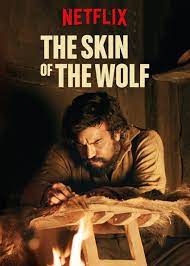
THE SKIN OF THE WOLF/ BAJO LA PIEL DE LOBO
Spain, 2018, 110 minutes, Colour.
Mario Casas, Irene Escolar, Ruth Diaz, Kandido Uranga.
Directed by Samu Fuentes.
This is a serious portrait of a Spanish mountain man at the end of the 19th century, living alone, hunting, deer, walls, collecting skins, treating them and bringing them to the town for sales. He lives a solitary life. Because of this life he tends to be brutish, especially in his attitude towards women.
The mountain man is played by the Spanish star, Mario Casas, featured in many thrillers, a popular star. Here, he is laconic, bushy beard and hair, mountain clothes, first seen trapping a deer, confronting the wolves, continuously at work, coming into the town.
When his friend at the bar advises him to take a woman to his home, he is hesitant but then does a deal with the father of the woman with whom he has sexual encounters when visiting the town. She returns, fulfils her role, the sexual presence, but no real relationship between the two. She is already pregnant, miscarries, dies – the hunter distraught, smashing all the crosses in the cemetery (he lives near the ruins of an old town). When he brings the body down to the town and gives it to the father who knew the situation of his daughter, the father then offers his youngest daughter on the condition that they marry.
Life resumes in the mountains, the wife treated as a sexual object, no personal response from the Hunter, the wife doing all the chores, becoming pregnant, miscarrying.
However, her father has given her some poisonous herbs in case of a crisis. The wife grinds the herbs, begins to poison her husband. She attempts an escape, foot caught in a trap, brought back by the husband.
The film opens with long shots of beautiful mountain photography in Asturias, to be contemplated throughout the film, the various seasons and the blend of harshness and beauty. In fact, the film could be called contemplative in observing and life of the mountain man, his work, patriarchal traditions concerning women, the elements of the brutish in the male character.
- The title, the tone, the hunter, the hunted?
- The importance of the location photography, long sequences, the visuals, the mountains, the valleys, the seasons? The musical score?
- The period, the 19th century, basic life in the mountains, the ruins of the town, the cemetery? The town itself, homes, the bar?
- The world of the hunter, out in the mountains, the opening sequence with the deer, shooting, skinning, carrying home, kept for meat? The confrontation with wolves? The other animals, the flights of birds? The world of nature?
- The portrait of the hunter, his age, appearance, beard and hair, clothes, rifle, out in the mountains, the deer, daily life, sowing his crops, the goats, milk, setting the traps, the routines, eating ravenously, working at night? The seasons passing? The trip to the town, his load, lowering it, coming down on the rope? The bar, the bar keeper as his friend, advice? The mayor, the skins, the haggling? The bar keeper advising him to get a wife? Going to the widow before leaving the town, the sexual encounter? the deal with her father?
- The widow, returning with the mountain man, his minimal speaking, interior emotions, brutish in his manner? The sexual encounters, her illness, pregnancy, giving birth, the dead child? The mountain man and the burial, taking the bodies to the town, giving them to her father? Her father knowing the situation, his doing a deal with his youngest daughter?
- The wedding, the formalities, the return to the mountains, the difficulty for the young woman, slow, the climb with the rope, as stopping to give her water? Installing her in the house, the equivalent of his property, the sexual encounters? Crops, the goats, singeing the skins? The effect on her, morose, no response from her husband, her father giving her the herbs for any desperate situation, her grinding them, then poisoning her husband?
- His continuing his work, but getting sick, more tended towards his wife when he learns she is pregnant? Telling her she could leave?
- Her escape, in the snow, her leg caught in the trap? Her husband searching for her, finally finding her, bringing her home, attending her foot? Her miscarriage?
- The fate of women in these circumstances? Her decisions?
- The final scene of the mountain man, lying on his bed, the open door?